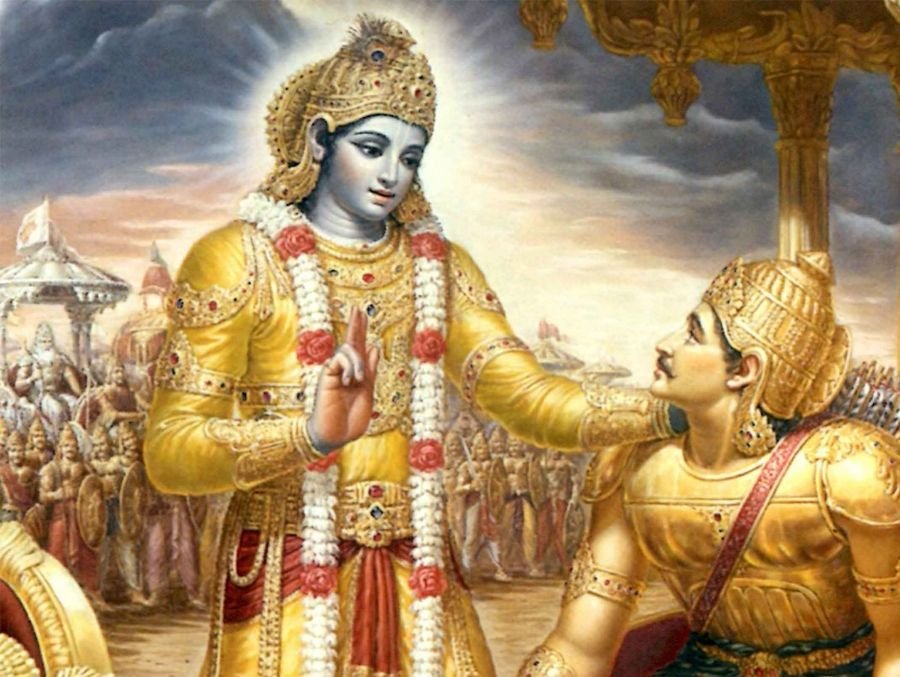(Image Courtesy Mahanidhiswami)
Once God Is Realised, The Soul Is Freed From The Cycle Of Life And Death, And It Enters God’s Divine Dwelling
मामुपेत्य पुनर्जन्म दु:खालयमशाश्वतम् |
नाप्नुवन्ति महात्मान: संसिद्धिं परमां गता: || 8.15||
mām upetya punar janma duḥkhālayam aśhāśhvatam
nāpnuvanti mahātmānaḥ sansiddhiṁ paramāṁ gatāḥ|| 8.15||
Shloka Translation
BG – Ch. 8- Ver. 15:
Because they have gained the utmost perfection, the great souls are no longer susceptible to rebirth in this world, which is transient and full of misery.
Explanation
Once God is realised, the soul is freed from the cycle of life and death, and it enters God’s divine dwelling, where it will live forever. It does not reincarnate in the material world and undergo its sufferings. From birth to death, life in the material world is full with misery.
We experience pain and misery throughout our lives, which is caused by our own bodies, minds, people, and situations. Finally, we die, which is another extremely terrible experience. But why would God subject us to so much suffering? The objective of these trials, according to God’s plan, is to make people realise that the physical domain is not the soul’s permanent home. It is a place of correction for souls who have forgotten God and are stuck in the material world. These trials and tribulations aid in the development of the soul’s desire for God.
Pain is a warning sign that something is wrong and has to be fixed. Similarly, the pain and misery we experience in the physical world serve as a stimulus for us to reject our faulty consciousness. These serve to encourage and stimulate lost souls to pursue their ultimate goal of unity with God.
Those deserving souls who devote themselves solely to God and His Divine Abode achieve God and enter His Divine Abode. Those spirits that remain engrossed in material wealth and forsake God, on the other hand, will continue to cycle through birth and death. We get what we make ourselves worthy of, as well as the endeavours we choose to undertake, in the end.
Verse & what we can learn
What happens if we dwell on Ishvara while fulfilling our responsibilities? In this shloka, Shri Krishna answers the question. He claims that such people do not reincarnate after death. They achieve something far greater – they achieve Ishvara himself.
Our physical existence is transitory, which implies we have no sense of permanency. Every part of our lives is transient. It’s like trying to cling on to a bubble as a perpetual quest for happiness via impermanence. The majority of people believe it is normal to pursue this goal. Some, however, have recognised the futility in this endeavour and have began their trek to Ishvara.
The majority of people believe it is normal to pursue this goal. Some, however, have recognised the futility in this endeavour and have began their trek to Ishvara. Those who follow this route with sincerity reach the ultimate goal: Ishvara himself. We will never return to the world unless we obtain Ishvara. It’s as if we’ve awoken from a dream; we won’t be able to return. We shall never reach Ishvara if we cling to the world. It’s a case of either/or.
As a result, once we’ve decided that Ishvara is our objective and have developed dispassion or vairagya toward the world, we should devote ourselves to karma yoga and meditation, as recommended by Shri Krishna in the Gita. Shri Krishna brings the discussion of achieving Ishvara through meditation to a close here.
To acquire knowledge and to implement that knowledge in life one needs to be mentally and physically active and healthy and for that daily meditation is a great tool.
There are various types of meditation like Buddhist meditation, heartfulness meditation, mindfulness meditation, meditation for stress, and each meditation benefits are countless. There are also numerous meditation techniques for beginners which help in practicing daily meditation so go ahead and start your journey towards a peaceful and balanced life.
In the Next verse, Shri Krishna tells Arjuna about creation and dissolution of the universe.
Let’s learn to live with “The Gita” via Meditation Affinity…
